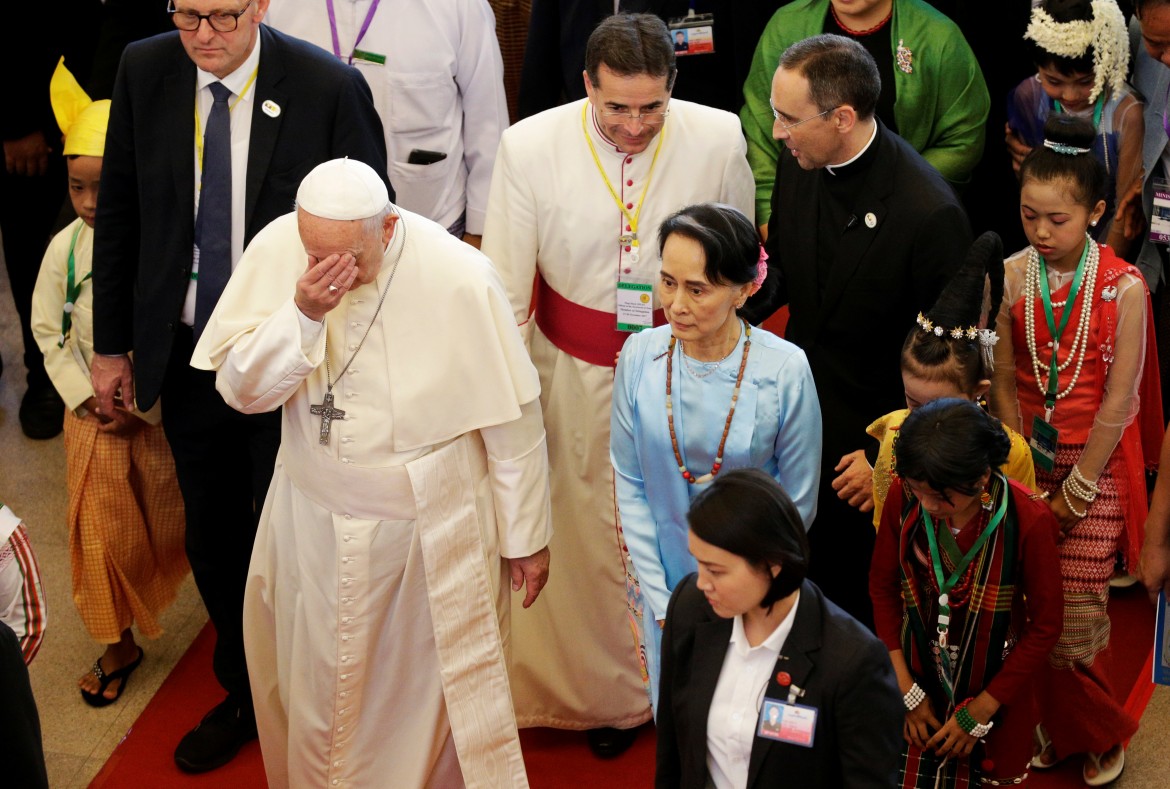Analysis
He didn’t say ‘Rohingya’
Pope Francis met with Aung San Suu Kyi and called for respect and peace between ethnic groups. But out of diplomatic courtesy and concern for the safety of Catholics in Myanmar, he didn’t say the word.

“Rohingya” was the taboo word that Bergoglio, in the end, did not say out loud. At least not in public.
During his second day in Myanmar, Pope Francis, who on the previous day had met with the oldest and highest-ranking general in the country for only 15 minutes, spoke with Nobel Prize winner Aung San Suu Kyi for 45 minutes. It was a private conversation, and most likely not a very ceremonious one, in which the pontiff must have spoken about the drama of the Rohingya community, about which he has said powerful words in the past from the window of his study overlooking St. Peter’s Square.
The man who called the Rohingya “brothers and sisters,” and who, according to confidential sources, has already taken up the matter with the Nobel Prize winner on the occasion of her visit to Rome last summer (when the Vatican and Myanmar resumed diplomatic relations), emphasized some important points in his public speech, which he also reiterated in his meeting with the local religious leaders. The Pope called for the construction of a “just, reconciled and inclusive social order,” and reminded them (as only few do nowadays) of the importance of the U.N.’s role.
Most importantly, he said that “the future of Myanmar must be peace, a peace based on respect for the dignity and rights of each member of society, respect for each ethnic group and its identity, respect for the rule of law,” and also “respect for a democratic order that enables each individual and every group — none excluded — to offer its legitimate contribution to the common good.” The language was very clear, particularly in the addition of “none excluded,” equivalent, in diplomatic language, to saying the word “Rohingya.”
The Pope added that “religious differences need not be a source of division and distrust, but rather a force for unity, forgiveness, tolerance.” This is an idea that Pope Francis also took up in his meeting with the representatives of the various religious communities of Myanmar, speaking of a “chorus of differences” where diversity becomes an asset. Three Muslim leaders were also part of that group.
In her public speech, Aung San Suu Kyi stuck to formal tones and thanked the Holy Father for his visit and for the invitation to proceed with the construction of a new society. No mention of the drama of the Rohingya, just a brief digression where she used the term “Rakhine” (the state from which the Rohingya have been chased away). Nothing more.
There remains a mystery regarding the change in the Pope’s schedule, which initially featured a meeting with the powerful General Min Aung Hlaing, the army’s strongman, on Nov. 30. Perhaps Francis preferred to avoid the pomp of a too-official meeting and preferred a brief private meeting instead, maybe to avoid giving too much importance to the general. He reserved his attention, with all the trappings of ceremony, to both President Htin Kyaw and his de facto prime minister, Aung Sann Suu Kyi. There was no public address on the occasion of meeting the general, as it was only a small stop required by etiquette. The pontiff gave him nothing more than the respect the circumstances demanded.
The Pope’s journey to Myanmar is coming to an end, and, before continuing on to Bangladesh, it includes a meeting with the leaders of the Sangha, the “Vatican” of the Burmese monks, and with the committee of monks who interact with the government and govern the relations between laity and clergy. It is easy to imagine that he will again repeat his message of unity beyond religious affiliation in their company. That is one way to hint at the Rohingya, but also at the small Catholic community of only 700,000 souls.
Then it will be time for his trip to Bangladesh, where it is now virtually certain that Francis will meet a group of Rohingya. The Pope will not, however, visit Cox’s Bazar, where a throng of more than 600,000 refugees are living in brutal conditions. The Rohingya delegation will most likely meet him at Dhaka, possibly on Dec. 1. It will be only 24 days before Christmas, the most important day for a Catholic, and also the time when many people go on holiday to Bangladesh, nowhere else than at Cox’s Bazar, known for having the longest beach in the world. And now also for being a living hell.
Originally published at https://ilmanifesto.it/il-papa-la-nobel-e-il-generale-convitati-di-pietra-i-rohingya/ on 2017-11-29
